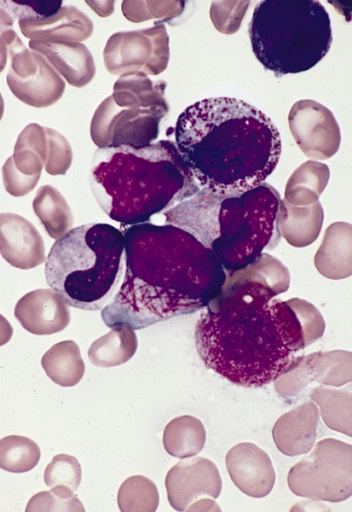Acute Promyelocytic Leukemia
Watchlist
Retrieved
2022-04-26
Source
Trials
—
Genes
NPM1,
RARA,
NUMA1,
PML,
ZBTB16,
STAT5B,
IRF2BP2,
PRKAR1A,
FLT3,
F3,
KIT,
ITGAM,
CEBPA,
AKT1,
THBD,
DNMT3A,
WT1,
IFNG,
STAT3,
ITGB2,
TBL1XR1,
CD44,
BCOR,
DAPK2,
AQP9,
NRAS,
ITGAL,
CEBPE,
IDH1,
IDH2
NPM1,
RARA,
NUMA1,
PML,
ZBTB16,
STAT5B,
IRF2BP2,
PRKAR1A,
FLT3,
F3,
KIT,
ITGAM,
CEBPA,
AKT1,
THBD,
DNMT3A,
WT1,
IFNG,
STAT3,
ITGB2,
TBL1XR1,
CD44,
BCOR,
DAPK2,
AQP9,
NRAS,
ITGAL,
CEBPE,
IDH1,
IDH2,
ITGAX,
IL17A,
TET2,
NABP1,
GLI2,
GLI1,
SMO,
DEFA3,
SMC1A,
FNDC3B,
MIR15A,
FIP1L1,
MIR16-1,
BIRC5,
RAP1GAP,
ASXL1,
CCL7,
MYC,
TP53,
FANCB,
PRAM1,
CSF3,
RAB40B,
BCRP3,
CD34,
ANXA2,
BCR,
MPO,
TNF,
SMPD1,
CD38,
SUMO1,
RUNX1,
ABCB1,
BCL2,
ELANE,
CD33,
MECOM,
NCAM1,
SP100,
CCR7,
PIK3CG,
PIK3CB,
CTSG,
BCRP2,
PIK3CA,
PIK3CD,
IL1B,
ANXA8,
ANXA8L1,
RUNX1T1,
CDKN2A,
NCOR2,
TRIB3,
CXCL8,
RARG,
ERBB2,
THRA,
CASP3,
CEBPB,
VEGFA,
CDKN1A,
ABL1,
NFE2L2,
GABPA,
ANPEP,
NCOR1,
RNF4,
SUB1,
RUNX2,
KMT2A,
IRF8,
AS3MT,
ICAM1,
AIDA,
SET,
TRBV20OR9-2,
ABCC11,
TERT,
PTK2B,
ABCC8,
NXT1,
HIF1A,
CSF2,
TBC1D9,
RARB,
C20orf181,
CDKN2B,
REG1A,
CDKN2D,
VAV1,
HOTAIRM1,
MRPL28,
PTEN,
MAPK14,
CSF1R,
G0S2,
LGALS3,
RXRA,
PLG,
MAPK3,
S100A8,
KRAS,
H3P9,
CYP26A1,
HPRT1,
PIN1,
MAP2K1,
HOXA1,
SUMO2,
PPARG,
MAP2K7,
SOAT1,
KDM1A,
PTPA,
SMYD5,
BRD4,
ODC1,
NUP98,
IL23A,
PADI4,
XAB2,
S100A10,
IL10,
JAK1,
CRLF3,
IL7R,
IL4,
IL3,
PRDX4,
MATN1,
HTC2,
MCL1,
RELA,
SGSM3,
IRF1,
PTPN11,
ABCC1,
PTGS2,
IRF9,
MFAP1,
SYT1,
MIR146A,
FASLG,
EGFR,
PTF1A,
ATG5,
TSHR,
TRAP,
GSTK1,
APRT,
DAXX,
UBA7,
SLC25A10,
MIRLET7C,
UBE2L6,
CRABP1,
H3P38,
TOP2B,
KDM6A,
RERE,
ATRX,
CDKN1B,
BCL6,
BLM,
CD19,
MIR221,
GPRC5A,
BCRP1,
CXCR4,
MBD2,
BRCA1,
TP73,
NEAT1,
ANXA1,
FCGR1A,
ST13,
ABL2,
GSTT1,
GORASP1,
GSTM1,
HDAC9,
WNK1,
FUT4,
FUT1,
FLT1,
H3P13,
BAALC,
ERG,
EOMES,
SLCO6A1,
JAG1,
THBS1,
TGM2,
PCGF2,
TGFB1,
F9,
DLK1,
ADAMTS13,
IER3,
CD84,
TNFSF10,
BLZF1,
CDKL1,
RASSF1,
PRDX3,
PIAS1,
EHMT2,
RPP14,
CKAP4,
TP63,
TNFRSF10D,
TNFRSF10C,
IL18R1,
TNFRSF10A,
PIM2,
SRA1,
SQSTM1,
PPIG,
SLC9A3R1,
CHST3,
ATG7,
BCAR1,
NR1D1,
RACK1,
RIN1,
KLK4,
NDRG1,
ISG15,
ZMPSTE24,
CDK2AP2,
PCLAF,
MVP,
ATP6AP2,
UBD,
PDLIM7,
EBP,
AGPAT2,
NAE1,
CCNA1,
TNFSF13B,
CTCF,
KHDRBS1,
PDPN,
RNF8,
PRC1,
AURKB,
TXNIP,
XPR1,
DMTF1,
NOG,
TRIM16,
MSC,
WIF1,
NAT1,
CHEK2,
CBLL2,
MIR10B,
MIR10A,
MIR107,
MIRLET7B,
ASPG,
NCR3LG1,
NUP43,
RAB7B,
CLEC4D,
NCR3,
CENPV,
PTCRA,
GPR180,
RMDN2,
PTGDR2,
DRAM2,
OVCA2,
PRRT2,
CGB8,
CGB5,
LGALS12,
HAVCR2,
LMNB2,
TCHP,
USP48,
ARHGAP24,
RNF34,
WLS,
MIR125B1,
MIR142,
MIR143,
MIR15B,
H3P30,
H3P8,
LOC110013312,
RN7SL263P,
PGR-AS1,
PCAT1,
KLRC4-KLRK1,
MIR766,
SNORD112,
PSG10P,
NCF1,
MIR382,
MIR342,
MIR340,
XRCC6P5,
ZFAS1,
PSG8,
MIR17HG,
MIR34B,
MIR34A,
MIR29B2,
MIR29B1,
MIR223,
MIR222,
MIR192,
MIR182,
MIR181A2,
DHDDS,
LIN28A,
MUL1,
HIPK2,
LAMTOR2,
IGHV1-12,
EML4,
HPGDS,
PDCD4,
DISC1,
ZBTB32,
GNL3,
PHGDH,
SENP3,
WIPI2,
ZNF451,
PRDX5,
SH3BP4,
NUP62,
CDK20,
PRAME,
SUZ12,
PHF8,
PEG10,
MYCBP2,
WDFY3,
DKK1,
KLRK1,
GABARAPL2,
USP18,
SP140,
RGCC,
KLF15,
MARCKSL1,
DERL2,
GPSM3,
BCORL1,
USP37,
ARID1B,
PNPLA2,
CHPT1,
ENAH,
SYBU,
KRBOX4,
QRSL1,
RMDN3,
MSTO1,
PIWIL2,
WIPI1,
SWT1,
RHOF,
MBD3,
BCL11A,
KDM3B,
ASB2,
GINS2,
SF3B6,
IKBKG,
WT1-AS,
LEF1,
DCTN4,
RMDN1,
PIR,
CCL5,
CNTNAP1,
IGFBP3,
GATA2,
FOS,
FLG,
FOXO3,
FOXO1,
FOXC1,
FH,
FGFR1,
FGF13,
FEN1,
F13B,
F13A1,
F10,
F2RL1,
F2,
EZH2,
EYA2,
ETV6,
ERBB4,
EPS15,
EPHB2,
EP300,
ELAVL1,
EIF4G2,
EIF4EBP1,
EGR1,
EGF,
KAT2A,
GCY,
GDNF,
HLA-DRB1,
ID1,
HTR3A,
HSPG2,
HSP90AB1,
HSP90AA1,
HES1,
HOXD3,
HOXB2,
HOXA9,
HNMT,
HMGN2,
HMGN1,
HK3,
GFRA1,
HIC1,
HHEX,
HGF,
HFE,
HDAC1,
HCK,
GTF2I,
GTF2H1,
GSTP1,
GSK3B,
GLB1,
GHR,
EFNA4,
E2F1,
DTNA,
AIRE,
CAMP,
CAD,
BRAF,
BMP6,
BMP4,
BMP2,
BIK,
BAX,
ARSD,
AR,
AQP7,
FAS,
APAF1,
CASP10,
ANXA5,
ANXA3,
ALOX5,
ALK,
ALB,
AGTR2,
AGL,
ADCY9,
ADCY7,
ACTL6A,
ACTB,
ABO,
CASP8,
CBR1,
ATN1,
CGB3,
ARID3A,
DNMT1,
DIO3,
DAPK1,
DAP,
CYP2B6,
CUX1,
CRYBA1,
CREB1,
KLF6,
CEACAM7,
CEACAM3,
CGA,
CCNA2,
CEACAM5,
CD52,
CDKN2C,
CDC25C,
CDK1,
CD68,
CD47,
CD14,
CD6,
CD2,
CCNE1,
CCNB1,
ID2,
IL1A,
PPM1D,
IL6,
TGM1,
TGFA,
TFRC,
TERC,
TACR1,
STAT5A,
STAT2,
STAT1,
SPI1,
SOD1,
SUMO3,
SMARCA4,
SLC1A2,
SHB,
SFRP1,
SDHD,
SCT,
ATXN1,
S100A9,
RPE65,
RNPEP,
RNASE3,
RET,
PLAAT4,
RAF1,
RAD21,
PVT1,
TIMP1,
TNFAIP2,
TPMT,
ZFP36,
NR0B2,
FZD9,
ARID1A,
TAM,
NCOA3,
CDR3,
WT4,
TFEB,
DEK,
ZMYM2,
RNF112,
MZF1,
XRCC1,
TWIST1,
XPO1,
XBP1,
WNT5A,
VIM,
VHL,
VDR,
UVRAG,
UCN,
UBE2I,
UBE2E2,
TYMS,
TXNRD1,
PTPRC,
PTPN6,
PTGS1,
MCM2,
MRE11,
MPST,
MPL,
MMP9,
AFF1,
MLLT1,
MAP3K10,
MLF1,
MGMT,
RAB8A,
MEIS1,
MDM4,
SMAD4,
COX1,
LPA,
LMO2,
LMNB1,
LMNA,
LGALS1,
LBR,
STMN1,
LAMP1,
KLRD1,
KLRB1,
IL18,
IL15,
MSH3,
MYB,
PTGDS,
PLSCR1,
PSMC6,
PSG5,
PSG2,
PROS2P,
MAPK8,
MAPK1,
PRKCB,
PRKCA,
SRGN,
PRF1,
POLD1,
PMAIP1,
PLAT,
NEDD8,
PHB,
PGR,
PFAS,
PECAM1,
PDGFRB,
PBX1,
PAX5,
PRKN,
NOTCH1,
NME1,
NGFR,
NFIL3,
H3P10
Drugs
—
Registered!

Acute promyelocytic leukemia (APL) is an aggressive type of acute myeloid leukemia in which there are too many immature blood-forming cells (promyelocytes) in the blood and bone marrow. This build up of promyelocytes leads to a shortage of normal white and red blood cells and platelets in the body. The signs and symptoms of APL include an increased risk to both bleed and form blood clots. Individuals may also experience excessive tiredness, pain in affected areas, loss of appetite, and weight loss. APL usually occurs in middle-aged adults, but can be diagnosed at any age. It is caused by a mutation that is acquired over a person's lifetime, usually involving a translocation between chromosomes 15 and 17. Treatment may include the use of all-trans retinoic acid (ATRA) and arsenic trioxide or anthracycline-based chemotherapy.